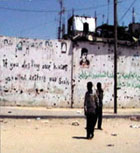
Forbidden to Wander/ Mane’ Tajawwul 2003
Distributed by Third World Newsreel, 545 Eighth Avenue, 10th Floor, New York, NY 10018; 212-947-9277
Produced by Susan Youssef, Mohammed Hamdan
Directed by Susan Youssef
DVD, color, 35 min.
Jr. High - Adult
Human Rights, Political Studies, Middle East, Multiculturalism, Diversity Studies, Palestine, Israel, Sociology
Date Entered: 06/13/2011
Reviewed by Malcolm L. Rigsby, Department of Sociology, Ouachita Baptist University, Arkadelphia, ARIn early spring 2011, I became acquainted with a new film touted to be “the first fiction feature film set in Gaza in over fifteen years.” The film Habibi is a story of a couple’s love in a state where they are “forbidden to wander.” Unable to be physically one, they must devise means by which to unite in spirit and love. As I researched Habibi I read that the young director, Susan Youssef, began work on the film in 2002. Through her persistence, eight years of diligent filmmaking has materialized in the soon to release film Habibi. Further, in an effort to reach her ancestral roots and to better understand the restrictions placed on the people of the West Bank and Gaza she traveled there in 2002. Youssef did not go alone; she took her professional camera! In the West Bank and Gaza, she traveled camera in hand, reflecting upon life for lovers trapped in a land where those who fall in love are constantly under curfew and observation. The result of her 2002 trip was the short film Mane’ Tajawwul translated Forbidden to Wander.
Film students will find this film an excellent preparatory tool. Class discussion may develop around Youssef’s filming techniques, her trials and tribulations as a novice director, her undaunted persistence and desire to make the film or her practical challenges in dealing with the actors and peripheral groups or onlookers. Rich, deep discussions may evolve, as viewers perceive what Susan learns about her field of endeavor and how she must reflexively adjust and remain undaunted. Finally, while Forbidden to Wander offers several valuable points of departure for debate and critique, it more importantly serves to show that while good filmmaking is often difficult and filled with obstacles, it is truly rewarding and achievable to those involved. Beyond this, filmmakers, especially independent filmmakers, provide venues for society to find out news, and to understand political, cultural and social issues. At a March 16, 2011 Gonzaga University screening of Forbidden to Wander (with select scenes from Habibi), Youssef remarks that when she arrived in Palestine in 2002 she lacked direction in envisioning Forbidden to Wander. She admits the film was a “student work.” However, this student designation also establishes it firmly as an inspirational learning tool for future and established filmmakers. One might say that its weakness becomes its strength. Susan Youssef is a true talent in independent filmmaking. Forbidden to Wander has been screened at the Museum of Modern Art in New York, and the National Museum of Women in the Arts.
Whether viewing Forbidden to Wander for personal enjoyment, reflection on how people around the world live, as a source of education, or as an exercise in how to use strategy to direct and produce your own film, Forbidden to Wander is an excellent choice. Forbidden to Wander may be viewed as a foundation for both Youssef as a person and director, and her new feature film Habibi. With Habibi scheduled to open soon, I suggest that viewers may appreciate and enhance the experience of a love story through viewing both films in tandem.
Watch this young, persistent, creative director. She is sure to have a bright future. Susan has the distinction of being voted by Filmmaker Magazine as one of the 2010 “25 New Faces” to filmmaking. I will bet there is at least one university that wishes they had approved her student proposal to travel to the Middle East and create the film that turned out to be Forbidden to Wander!